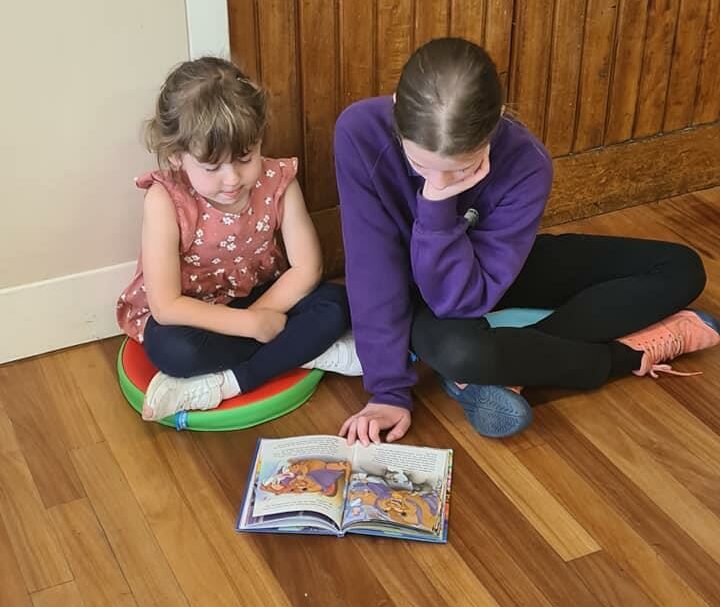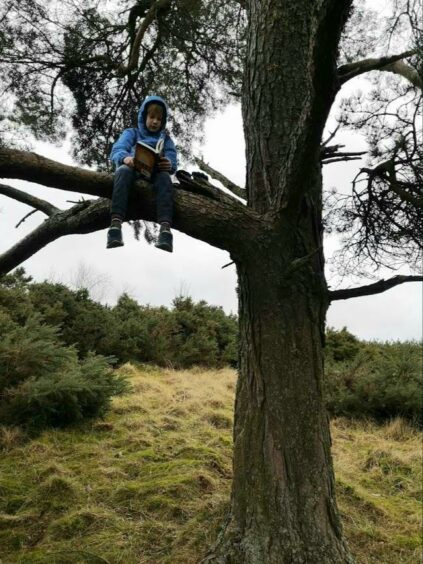As our lives get busier and our technology gets smarter, is it true that fewer parents are making the time to snuggle down with a bedtime story at night? And if it is true – does it even matter?
After all, the world is changing. Parents work longer and longer hours and there’s growing competition from on-demand programming, tablets, apps and games.
The National Literacy Trust says that less than half of children are read to every day. This increases to around 58% in the pre-school years and then drops back when reading becomes a ‘school’ activity. The same research – undertaken with Nielson – also shows that screentime is increasing rapidly even for babies.
Yet parents and kids alike will rave about the joys of storytime. It offers a quiet, cosy bubble at the end of a hectic day. Reading to children has enormous educational and emtional benefits.
‘My parents read to me when I was small’
Last October, 15-year-old Mintlaw Academy student Leah Findlay wrote a stunning personal essay on this subject, for Penguin Books’ Creative Student Prize. She wrote:
“My parents read to me when I was small. Fairytales and fantasies, books about princesses, pirates, witches and dinosaurs. They were my favourite. I knew the words to my favourite storybooks by age five, and I was immensely proud of that.
“When I was seven, I read a dictionary on a caravan holiday after ploughing through the stacks of books I had packed. Age eight, I read the entire Harry Potter series in a matter of weeks after borrowing them from a family friend. Age nine, I would enter bookstores with my parents in tow and exit carrying armfuls of books…
“Books are not just things to me. They are snapshots of my life, whether it’s a Julia Donaldson picture book reminding me of my dad, an inspirational memoir reminding me of lockdown, or a tatty Rick Riordan novel reminding me of primary school.”
Has bedtime reading been an important part of your family life? Take our poll and let us know.
Imagination and bonding
Joolz Christie’s teenage daughter has similary fond memories. Joolz is a High Life Highland librarian at Ullapool library and a devoted leader of Book Bug – the storytelling scheme run by the Scottish Book Trust. She has fond memories of taking her kids to Book Bug when they were little, and says she continued to read to them “long after they were old enough to read to themselves.”
Before she spoke to the P&J about the benefits of reading to children, Joolz asked her kids for their memories of reading together. “I spoke to them and they came up with loads of stuff about the bonding time, the imagination… they loved it and I loved it,” says Joolz. “We live such busy lives, and with technology it’s so easy to just chuck them in front of a screen. I’m not judging that. But even just setting aside 20 minutes at the end of every day is such a wonderful bonding opportunity, and it does wonders for their imagination and vocabulary too.”
In Joolz’ experience, there are still plenty of parents and children with an active interest in reading. Book Bug is currently on hold at Muir of Ord due to Covid distancing restrictions, but prior to the pandemic Joolz ran packed sessions at Dingwall library, with more than 20 families coming every week. During lockdown, Joolz soldiered on with online sessions, and she has also done outreach sessions with Syrian refugees at the Botanic gardens and Hallowe’en specials in the village square.
“Maybe fewer parents read to their kids now, but I think they may be reading from a younger age,” says Joolz, pointing out that when her kids were babies it never occurred to her not to read to them.
Today, national organisations like the Scottish Book Trust highlight the benefits of reading to children and make books more accessible through giveaways and Book Bug sessions at local libraries.
Take it home
The role of libraries has evolved too. There’s less heavy tomes and whispering, and more interactive sessions, singing and community events. When the library in Wick, Caithness, moved to a new community campus on the edge of town, visitor numbers did not drop. Thanks to a new location alongside the school, swimming pool and gym, visitor numbers doubled.
Libraries now are more open and community focused. Joolz says the noisy, cheerful Book Bug sessions have led to more children checking out library books. This, she says, is the whole point.
“We’re not children’s entertainers,” she says. “The idea is that we help parents and children discover the joy of reading. The Book Bug teddy sits on our lap and we sing to him and read to him, and the idea is parents do the same with their kids, in the library and back at home.”
Follow their interests
For parents who feel daunted by the idea, there’s lots of useful advice and ideas on the Scottish Book Trust website. Joolz suggests starting with a little every day, to build a positive habit.
From her own experience with Book Bug, she notes that reading picture books, rhyming books and using an engaging tone all help to keep little ones’ concentration. It’s best to pick stories that are short and interactive. Joolz also says that boys generally (but not always) lose interest quicker than girls.
She suggests following their natural interests, or trying out stories where they make up their own ending. Older siblings reading to younger brothers and sisters is also a great way to encourage reading and bonding.
The research shows that when kids hit school age, parents tend to spend less time reading to their kids, seeing it more as a school activity. Older children may also be more independent and want to read alone. However, parents can still take a healthy interest in encouraging children to read.
Accelerated Reader
In Aberdeenshire, Keig Primary School has an impressive track record with reading, and headteacher Jane Murison has adopted a number of approaches to instil a love of reading at home and in school. Pupils of all ages read every day, often in pairs with older pupils, and the school has a huge library of books that were bought or donated. Initiatives like book fairs, World Book Day activities and book swaps all keep things fresh, and Jane is also not precious about what constitutes reading – she points out reading e-books, podcasts, story quests and websites all benefits children too.
At Keig, the Accelerated Reader programme is a particular success – and it helps bridge the gap between school and home. “Accelerated Reader was started in America by a parent who wanted to encourage their kids to read,” explains Jane. “She sat down at her kitchen table and made up quizzes based on the books. A lot of schools across the world use it now, and it’s a great source of information and guidance.”
Accelerated Reader ranks books according to reading level, with quizzes and recommendations to track progress. It means that parents at home – and the pupils themselves – can choose books that are not too easy or difficult. There’s clear progression and rewards such as ‘Renaissance Reader’ – where the school recognises reading milestones with a certificate in assembly.
Who wants to be a millionaire?
Jane joined Keig Primary School in 2007. She says that as the years roll on, pupils are engaging with Accelerated Reader at a younger and younger age. In fact, she is having to stock the library both with books for very young children and more challenging books for senior pupils.
A few years ago, Keig was the top school in Scotland on the Accelerated Reader programme. Their results are impressive. Jane says every child in the school is reading at, or beyond, their age, including children with additional support needs. Some of her P7 pupils have gone to secondary school with a reading age of 16.
“Reading has a very high status in our school and there’s so many benefits for children,” says Jane. “These have a knock-on effect across the whole curriculum. Reading promotes critical thinking, concentration, empathy, imagination and creativity. It opens up the whole world.”
The high status of reading is cemented through the school’s popular Millionaires Club. Jane explains: “Kids who have read a million words get a star on the wall and a gold badge. However, we felt it was unfair on the younger pupils so we started celebrating quarter millionaires, one thousand words etc. Soon we had pupils rushing about wanting to be part of the Millionaire Club. They were encouraged by the older children. There are only 28 children in this school and we have read 36 million words.”
Reading for healing
The school kept the fun going throughout lockdown, with a ‘caught reading’ photo challenge and a game where teachers and other school staff acted out the titles of popular books for the pupils to guess. “The children really missed reading together in lockdown and when they had separate bubbles under Covid restrictions,” says Jane. “Reading brought us back together. It helped us to heal.”
For Leah Findlay, books helped her heal from the pain of losing her father to cancer, in 2020. Pengiun Books said of her essay: “Leah’s Creative Student Prize submission is a compelling and deeply personable essay that stunned the judging panel. It served as a reminder of how influential books have been in our lives – from offering a sense of escapism, learning about our identity and society, helping us manage our mental health, to strengthening our relationship with our loved ones.”
Here’s more from Leah’s submission:
“When my dad died, I buried myself even deeper in my fantasies. I cried for the characters in my books, and pretended that I wasn’t crying for my dad. I imagined myself as these battle-scarred yet triumphant characters I read about, hoping that I could triumph too. Maybe, with the help of my books, I could emerge from my battles victorious, and everything would be fine.
“Books helped me to lose myself, but they also helped me find myself. Pouring [sic] through the pages of my books, I discovered myself piece by piece. I learned what meant the most to me, what I was passionate about, what I wanted to do with my life. Every time I opened a book, another piece of myself fell into place.”
She concludes:
“I think of everything books have helped me through, and all the wars we have fought together. But most of all, I think of how grateful I am that my parents read to me when I was small.”
More from the Schools and Family team
Everything you need to know about UCAS – and how to write a winning personal statement
‘Roy Bridge has lost a lot’: Village school could close for good this year
Nursery inspection reports: How does the childcare in your area rate?



